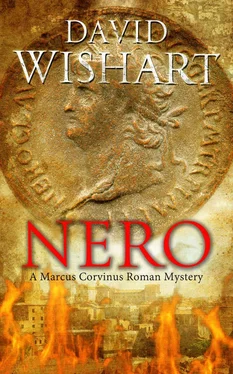David Wishart - Nero
Здесь есть возможность читать онлайн «David Wishart - Nero» весь текст электронной книги совершенно бесплатно (целиком полную версию без сокращений). В некоторых случаях можно слушать аудио, скачать через торрент в формате fb2 и присутствует краткое содержание. Год выпуска: 2015, Жанр: Исторический детектив, на английском языке. Описание произведения, (предисловие) а так же отзывы посетителей доступны на портале библиотеки ЛибКат.
- Название:Nero
- Автор:
- Жанр:
- Год:2015
- ISBN:нет данных
- Рейтинг книги:4 / 5. Голосов: 1
-
Избранное:Добавить в избранное
- Отзывы:
-
Ваша оценка:
- 80
- 1
- 2
- 3
- 4
- 5
Nero: краткое содержание, описание и аннотация
Предлагаем к чтению аннотацию, описание, краткое содержание или предисловие (зависит от того, что написал сам автор книги «Nero»). Если вы не нашли необходимую информацию о книге — напишите в комментариях, мы постараемся отыскать её.
Nero — читать онлайн бесплатно полную книгу (весь текст) целиком
Ниже представлен текст книги, разбитый по страницам. Система сохранения места последней прочитанной страницы, позволяет с удобством читать онлайн бесплатно книгу «Nero», без необходимости каждый раз заново искать на чём Вы остановились. Поставьте закладку, и сможете в любой момент перейти на страницу, на которой закончили чтение.
Интервал:
Закладка:
Lucius lay on a purple and gilt couch. He was wearing a gorgeously ornate tunic in the Greek style, his copper-red hair bound with a gold charioteer's ribbon. Beside him, Acte looked splendid (make-up carefully applied can do wonders), although she was far more plainly dressed than he was.
When she saw us she grinned and elbowed the Ruler of the World in the ribs. Obviously we were back in favour.
'Darling,' she said, 'you're not being very welcoming. Say hello to my friends.'
The boy turned. He still had that fragile prettiness I remembered from the racetrack, enhanced by delicately rouged cheekbones and mascara'd eyelashes. The eyes themselves were bright and restless, shifting towards my face and away again.
'Sir.' I inclined my head formally. Beside me Silia did the same.
'Petronius.' His voice was a thin, nervous tenor. 'Lady Silia. How lovely to see you both. Acte's told me so much about you.'
He stopped: a pause, I assumed, but he gave a little giggle and turned away. Even Acte looked surprised. She whispered something to him, but he shook his head and glanced towards the closed doors. Both movements had a sharpness I found both odd and disturbing. Acte, now, was frowning.
The slaves were serving the hors d'oeuvres. I knew most of the guests by name, of course, and some more intimately. They were a mixed bag. At the table next to ours Salvius Otho, Annaeus Serenus and the two Terentia sisters were squeezed together like amorous sardines on to the one couch. Otho was surreptitiously feeling up the younger Terentia's thigh, and Serenus already looked stewed. Diagonally across from us Burrus was in deep conversation with an elderly senator whom I didn't know; he caught my eye and nodded. At the table between him and the dais were another senatorial couple, Calpurnius Piso and his wife Licinia. They were listening to a much older man with a fringe of iron-grey hair and the jowly, bag-eyed face of a pregnant toad. Piso looked bored, and I didn't blame him: Annaeus Seneca in full spate was not the most entertaining of couch-mates.
Silia brushed my arm and I leaned against her. She put her lips to my ear.
'Look at Britannicus, dear,' she whispered. 'What a shame, the poor lamb!'
I turned in the direction her eyes indicated. Near the back of the room, out on its own and in the shadow of a pillar, was a small table at which Claudius's natural son reclined. Next to him lay a boy of his own age whom I didn't recognise. His coarse peasant features contrasted with the fine wool of an expensive mantle. The two were in deep conversation, ignoring the rest of the dinner party.
'Who's the other lad?' I murmured.
'Flavius Vespasian's son Titus.'
'Vespasian?'
'The African governor. Such a nice little boy, Acte tells me, and simply devoted to Britannicus. A pity his father's such a clodhopper.'
I must say now that I have no memory whatsoever of what we ate, drank or said at that first meal at the palace; but then there was, as you'll see shortly, a very good reason for that. What I do remember is Lucius calling over one of the servants at the dessert stage and whispering something in his ear; then, when Acte looked startled, giving the same tense little giggle I'd heard him use earlier. And, of course, I remember the subsequent arrival of Agrippina.
Her mantle was in the Alexandrian style, so stiff with gold leaf and pearls that it might have been made for a queen (perhaps it was). She was carefully made up and coiffeured, her eyelids lacquered with pearl-dust and her lips artificially reddened. At her entrance conversation faltered and faded away to nothing. Seeing her standing in the doorway I felt, myself, that someone had stepped over my grave. Beautiful Agrippina undoubtedly was, but for all her white breasts and faultless figure she carried a scent of rottenness.
Lucius stood up. He swayed slightly, holding out his hands towards her as if they were close enough to touch. His eyes were glassy. I wondered if he was drunk, but his speech was quite clear.
'I'm afraid you've missed dinner, Mother,' he called out. 'Such a shame. Still, it's lovely to see you. Come up here, darling. Sit by me and Acte.'
I looked at Acte. She was rigid, her eyes on Lucius.
'I'm sorry. I had a headache.' Agrippina hadn't moved.
Lucius gave his nervous, high-pitched giggle.
'Perhaps you should talk to Xenophon, then,' he said. 'He has such a nice bedside manner. And they say he's never willingly lost a patient.'
Agrippina's face froze: Xenophon, as I think I've mentioned, was the doctor who had poisoned Claudius. Slowly, and without a word, she walked the length of the silent room, mounted the dais and reclined on the edge of Lucius's couch as far from Acte as she could. The two women ignored each other.
'You must be absolutely ravenous, Mummy.' Lucius's eyes had never left her face. 'We can't have that, can we?' He reached behind him and snapped his fingers. A slave brought forward a steaming salver and took up a position by the empress's right shoulder. 'Mushrooms. The food of the gods. One nibble, my dear, and who knows what lovely things mightn't happen?'
Someone- I think it was Otho — smothered a laugh. One of the Terentias giggled. There were no other sounds. All eyes were on Agrippina and the dish of mushrooms.
'I'm not hungry, darling,' she said at last. 'Really.'
Lucius frowned. 'But I had them prepared specially. And I'll be terribly upset if you don't eat. We all will.' He snatched the spoon from the slave, scooped a mushroom from the dish and held it level with her lips. 'Please? Just a tiny one? Just one, for your little Lucius?'
I didn't like Agrippina, but I had to admit the woman had courage. Staring straight into Lucius's eyes, she opened her mouth. Lucius smiled, popped the mushroom in and closed her mouth gently with his free hand. She chewed and swallowed. The silence now was absolute.
Nothing happened. I thought I saw Agrippina sag a little on her couch, but I may have been mistaken. The exhalation of breath from the other diners was almost palpable.
'There, Mother. That wasn't so bad, was it?' Lucius was still smiling. He threw down the spoon and turned to face the room at large, 'And now darling Seneca is going to entertain us with a reading of his latest work. Seneca!'
All eyes except mine went to the jowly figure lying next to Piso. I was still watching Agrippina. Her eyes were closed, and under her make-up her face was grey.
Seneca, when I turned back to him, was looking distinctly embarrassed, his jowls red as a chicken's wattles.
'Oh, my dear boy!' he murmured. 'Oh, now, really! Perhaps under the circumstances it would be better to…ah…postpone…ah…'
'Nonsense!' Lucius was acting like a man in a high fever. His eyes were bright, his face was flushed and he was almost gabbling. 'Do come on, darling! We're all agog! Simply agog! Besides, you promised.'
A slave stepped forward with a book-roll. Seneca took it from him as though it were a live viper and undid the fastenings. Then he looked up and cleared his throat.
'My voice isn't…' He paused. 'Honestly, my dear fellow, do excuse me. To tell the truth I really am a little hoarse this evening.'
'Oh, you!' Lucius gave him a dazzling smile. 'You've the best reading voice in Rome, hoarse or not. Besides,' he glanced slyly at Agrippina, 'Mother is simply dying to hear it. Aren't you, Mummy?'
Agrippina didn't answer.
'Ah. Very well. If that is your wish, then naturally…' Seneca looked even more unhappy. He cleared his throat a third time, took a swallow of wine, and unrolled the book. 'It's called…ah…I call it the" Pumpkinification".'
The elder Terentia giggled. Seneca glared at her, cleared his throat yet again, and began to read: '"I would like to set down for the edification of future generations an account of what took place in heaven on the thirteenth of October, of this the first year of our Golden Age…"'
Читать дальшеИнтервал:
Закладка:
Похожие книги на «Nero»
Представляем Вашему вниманию похожие книги на «Nero» списком для выбора. Мы отобрали схожую по названию и смыслу литературу в надежде предоставить читателям больше вариантов отыскать новые, интересные, ещё непрочитанные произведения.
Обсуждение, отзывы о книге «Nero» и просто собственные мнения читателей. Оставьте ваши комментарии, напишите, что Вы думаете о произведении, его смысле или главных героях. Укажите что конкретно понравилось, а что нет, и почему Вы так считаете.












